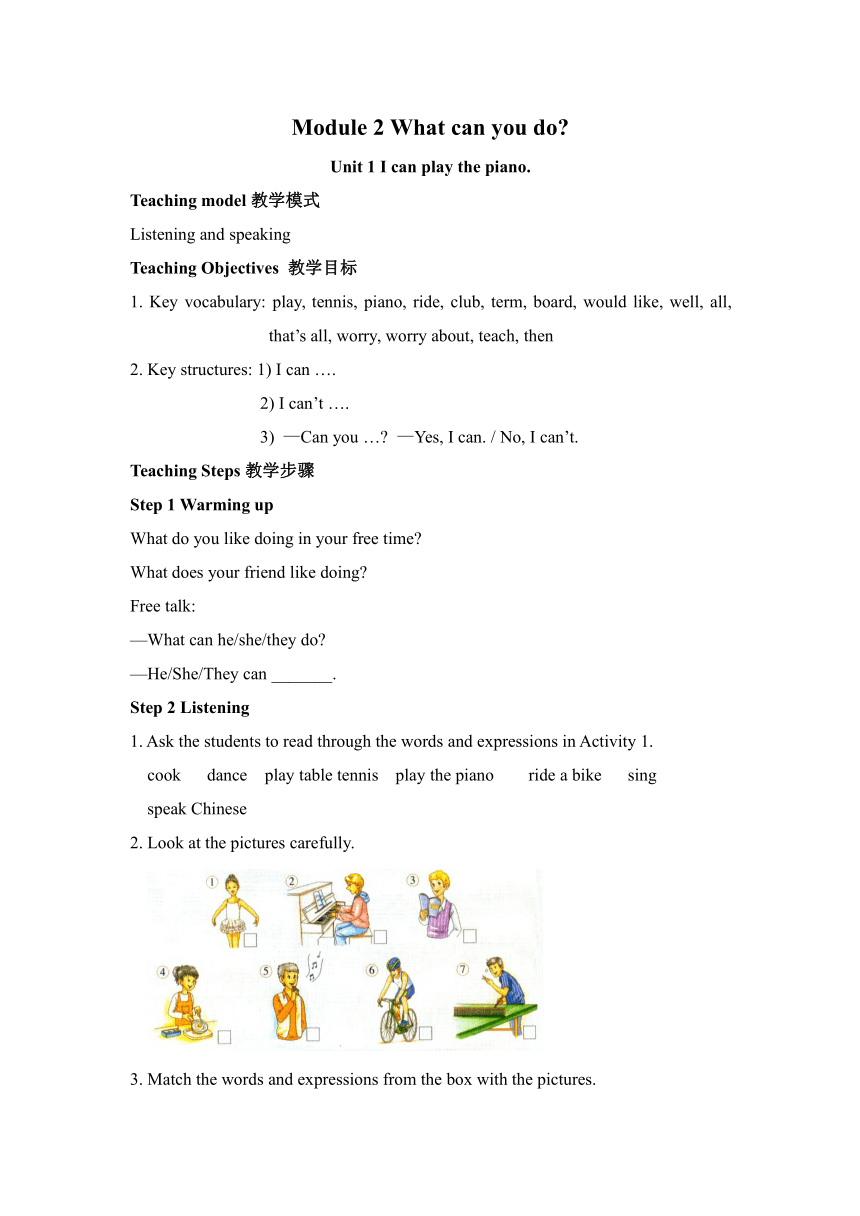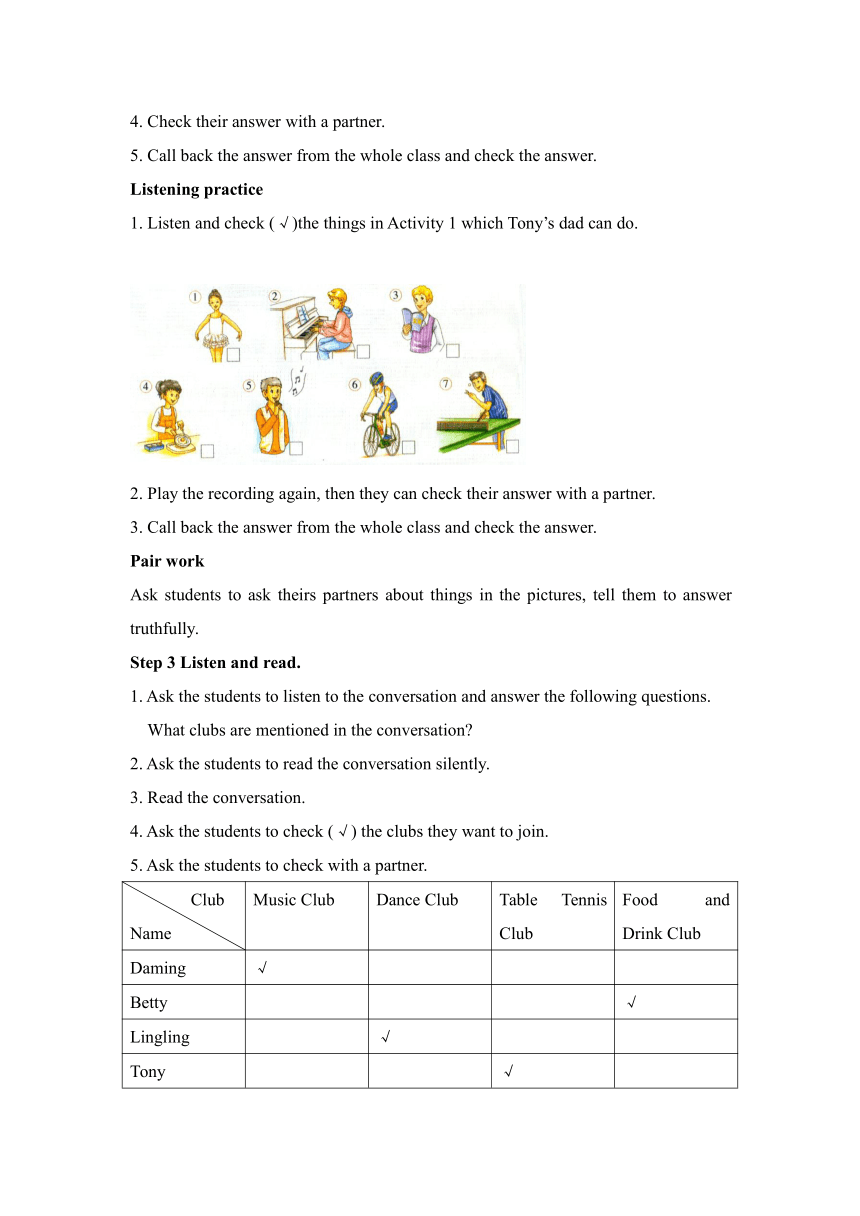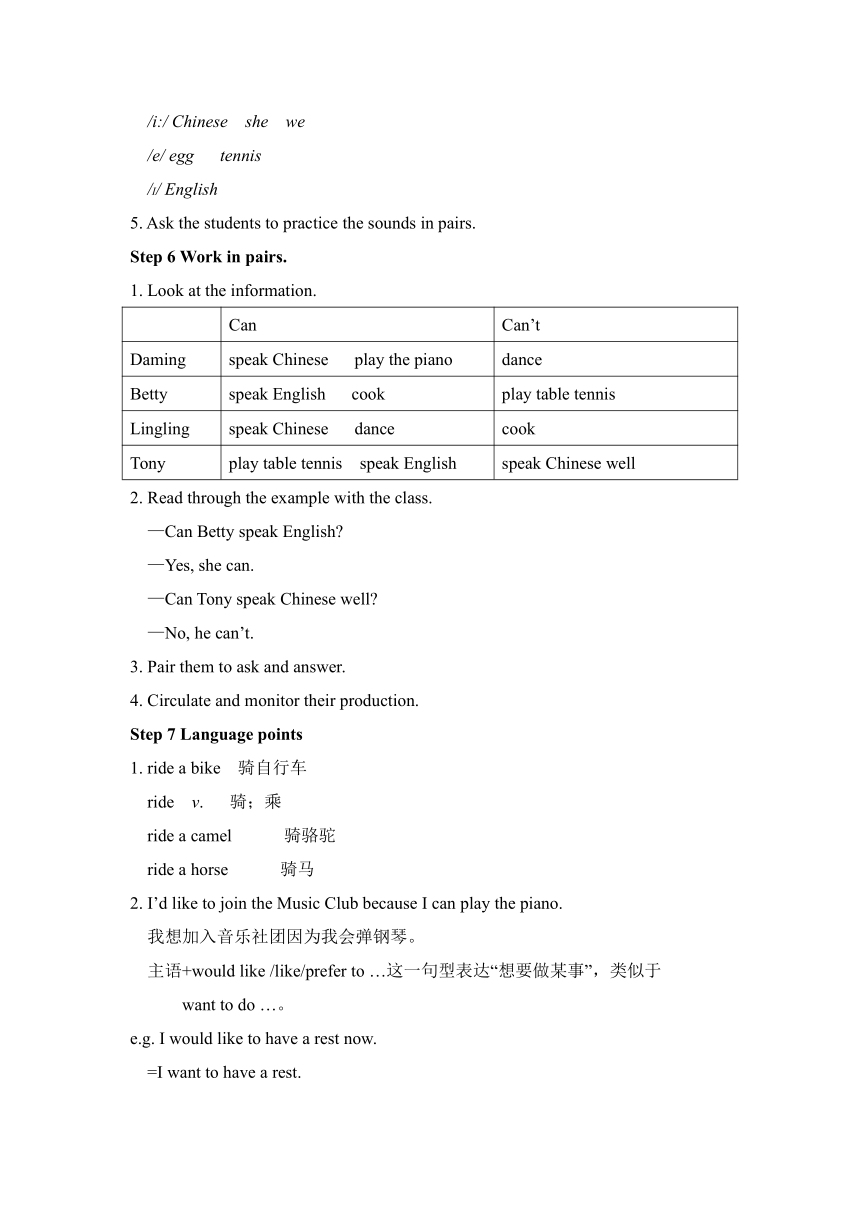Module 2 Unit 1 I can play the piano 教案 2023-2024学年外研版英语七年级下册
文档属性
| 名称 | Module 2 Unit 1 I can play the piano 教案 2023-2024学年外研版英语七年级下册 |

|
|
| 格式 | docx | ||
| 文件大小 | 656.1KB | ||
| 资源类型 | 教案 | ||
| 版本资源 | 外研版 | ||
| 科目 | 英语 | ||
| 更新时间 | 2024-02-22 12:46:10 | ||
图片预览




文档简介
Module 2 What can you do
Unit 1 I can play the piano.
Teaching model教学模式
Listening and speaking
Teaching Objectives 教学目标
1. Key vocabulary: play, tennis, piano, ride, club, term, board, would like, well, all, that’s all, worry, worry about, teach, then
2. Key structures: 1) I can ….
2) I can’t ….
3) —Can you … —Yes, I can. / No, I can’t.
Teaching Steps教学步骤
Step 1 Warming up
What do you like doing in your free time
What does your friend like doing
Free talk:
—What can he/she/they do
—He/She/They can _______.
Step 2 Listening
1. Ask the students to read through the words and expressions in Activity 1.
cook dance play table tennis play the piano ride a bike sing speak Chinese
2. Look at the pictures carefully.
3. Match the words and expressions from the box with the pictures.
4. Check their answer with a partner.
5. Call back the answer from the whole class and check the answer.
Listening practice
1. Listen and check (√)the things in Activity 1 which Tony’s dad can do.
2. Play the recording again, then they can check their answer with a partner.
3. Call back the answer from the whole class and check the answer.
Pair work
Ask students to ask theirs partners about things in the pictures, tell them to answer truthfully.
Step 3 Listen and read.
1. Ask the students to listen to the conversation and answer the following questions.
What clubs are mentioned in the conversation
2. Ask the students to read the conversation silently.
3. Read the conversation.
4. Ask the students to check (√) the clubs they want to join.
5. Ask the students to check with a partner.
Club Name Music Club Dance Club Table Tennis Club Food and Drink Club
Daming √
Betty √
Lingling √
Tony √
6. Role play the conversation in groups;
Role play the conversation in front of the class
7. Learn “Everyday English”
Look!
What about you
Don’t worry about….
Step 4 Practice
1. Ask the students to read the words in the box in Activity 4.
board choose club music term
2. Read through the passage.
Can you cook No Join the Food and Drink (1) __________. Can you play the piano Join the (2) __________ Club. What about dancing (3) __________ the Dance Club. There are lots of new clubs every (4) __________. They’re all on the (5) __________ and you can choose your favourite.
3. Complete the passage with the correct form of the words from the box.
4. Ask the students to check with a partner.
5. Check the answers:
Step 5 Pronunciation and speaking.
1. Say the sentences in Activity 5 aloud.
/k n/ I can play the piano.
/ka:nt/ I can’t speak Chinese very well.
/k n/ Can you cook
2. Listen and repeat.
3. Learning to learn
In English, we pronounce a word in different ways when it is stressed or not stressed. In “Yes, I can”, we pronounce can as /k n/; in “Oh, good. You can come to help us”, we pronounce can as /k n/.
4. Play the recording once without stopping.
5. Listen and repeat in Activity 6.
/i:/ Chinese she we
/e/ egg tennis
/I/ English
5. Ask the students to practice the sounds in pairs.
Step 6 Work in pairs.
1. Look at the information.
Can Can’t
Daming speak Chinese play the piano dance
Betty speak English cook play table tennis
Lingling speak Chinese dance cook
Tony play table tennis speak English speak Chinese well
2. Read through the example with the class.
—Can Betty speak English
—Yes, she can.
—Can Tony speak Chinese well
—No, he can’t.
3. Pair them to ask and answer.
4. Circulate and monitor their production.
Step 7 Language points
1. ride a bike 骑自行车
ride v. 骑;乘
ride a camel 骑骆驼
ride a horse 骑马
2. I’d like to join the Music Club because I can play the piano.
我想加入音乐社团因为我会弹钢琴。
主语+would like /like/prefer to …这一句型表达“想要做某事”,类似于
want to do …。
e.g. I would like to have a rest now.
=I want to have a rest.
play v. 演奏;弹琴; 打(球类)
e.g. My father plays the guitar (吉他) well.
Jack enjoys playing basketball on Sundays.
定冠词the用于西洋乐器前。
e.g. play the piano 弹钢琴
play the violin 拉小提琴
球类运动、下棋不用冠词:
play basketball 打篮球
play volleyball 打排球
play football 踢足球
play chess 下棋
3. Well, I can cook eggs, but that’s all.
我会炒鸡蛋,但仅此而已。
that’s all是口语中一句非常有用的表达,用法主要有以下三种:
1) 仅此这些或无关紧要,“没别的;没事;没什么;事情就是这样”。
e.g. —How are you feeling?你感觉怎么样?
—Fine. Just a little tired. That’s all. 还好,只是有点累,没事。
2) 表示沮丧或无可奈何,“没有(别的)办法”。
e.g. If it rains tomorrow, we shall have to stay at home, we can’t play football, that’s all.
如果明天下雨,我们只好呆在家里,不能出去踢球,没有别的办法。
3) 表示说话或做事完了(或暂时完了)。“……完了;……就这些”。
e.g. That’s all. Thank you. 我的发言完了,谢谢。
That’s all for today. 今天就到这里吧。
That’s all, you may go now. 就这些,你可以走了。
4. Don’t worry about Chinese.
别担心中文。
worry about = be worried about 担心
e.g. Don’t worry about your son.
= Don’t be worried about your son.
不要担心你的儿子。
5. We can teach you Chinese!
teach v. 教;教授
teach sb. 教某人
teach sb.+学科名词 教某人某学科
teach sb. sth. 教某人某事
teach sb. to do sth. 教某人做某事
T or F.
Mrs Wang teaches us English. ( )
Mrs Wang teaches our English. ( )
Step 8 Summary
would like 想要;希望
worry about ... 担心……
play the piano 弹钢琴
teach sb. sth. 教某人某事
speak Chinese 说汉语
play table tennis 打乒乓球
ride a bike 骑自行车
on the board 在布告板上
—Can you cook, Daming
—No, I can’t.
I'd like to join the Music Club because I can play the piano.
What about you, Betty
Don’t worry about Chinese.
Which club can she join
Step 9 Exercises
Ⅰ. 根据语境及所给图片提示或汉语提示语写出所缺单词。
1. Can you see any ________ in the music classroom
2. Many students in Jack’s class like playing ____________.
3. He wants to stay healthy, so he often ________ a bike to work.
4. My mother ________(教) maths in a primary school.
5. Look! The students are writing on those ________(布告板).
Ⅱ. 根据汉语意思完成英语句子,每空一词(含缩略形式)。
1. 他的英语说得不好。
He can’t ________ ________ well.
2. Maria想要在这儿照相。
Maria ________ ________ to take photos here.
3. 不要担心我!我很好。
Don’t ________ ________ me! I’m OK.
4. 我知道她的名字,不过仅此而已。
I know her name, but ________ ________.
5. 听!谁在弹钢琴?
Listen! Who is ________ ________ ________
Ⅲ. 根据对话内容从方框中选择能填入空白处的最佳选项补全对话,其中有两项多余。
A: Hi, Paul! The new term is coming. (1)_______
B: I want to join the Sports Club.
A: (2)_______
B: Because I like football, and I also want to learn to play ping-pong. (3)_______
A: I’m not sure. I like drawing, but my mother asks me to join the Maths Club.
B: (4)_______
A: Yes, of course. I’m good at drawing.
B: Well, I think you can join the Art Club because you like drawing.
A: (5)_______
A. Yes, I think so. B. Can you draw C. Welcome back here! D. What about you, Judy E. Can you join the club with me F. Which club do you want to join G. Why do you want to join that club
Step 10 Homework
1. Write sentences about what your parents can do/can’t do.
2. Remember all the new words and expressions we’ve learned today.
3. Preview the new words and expressions in Unit 2
Unit 1 I can play the piano.
Teaching model教学模式
Listening and speaking
Teaching Objectives 教学目标
1. Key vocabulary: play, tennis, piano, ride, club, term, board, would like, well, all, that’s all, worry, worry about, teach, then
2. Key structures: 1) I can ….
2) I can’t ….
3) —Can you … —Yes, I can. / No, I can’t.
Teaching Steps教学步骤
Step 1 Warming up
What do you like doing in your free time
What does your friend like doing
Free talk:
—What can he/she/they do
—He/She/They can _______.
Step 2 Listening
1. Ask the students to read through the words and expressions in Activity 1.
cook dance play table tennis play the piano ride a bike sing speak Chinese
2. Look at the pictures carefully.
3. Match the words and expressions from the box with the pictures.
4. Check their answer with a partner.
5. Call back the answer from the whole class and check the answer.
Listening practice
1. Listen and check (√)the things in Activity 1 which Tony’s dad can do.
2. Play the recording again, then they can check their answer with a partner.
3. Call back the answer from the whole class and check the answer.
Pair work
Ask students to ask theirs partners about things in the pictures, tell them to answer truthfully.
Step 3 Listen and read.
1. Ask the students to listen to the conversation and answer the following questions.
What clubs are mentioned in the conversation
2. Ask the students to read the conversation silently.
3. Read the conversation.
4. Ask the students to check (√) the clubs they want to join.
5. Ask the students to check with a partner.
Club Name Music Club Dance Club Table Tennis Club Food and Drink Club
Daming √
Betty √
Lingling √
Tony √
6. Role play the conversation in groups;
Role play the conversation in front of the class
7. Learn “Everyday English”
Look!
What about you
Don’t worry about….
Step 4 Practice
1. Ask the students to read the words in the box in Activity 4.
board choose club music term
2. Read through the passage.
Can you cook No Join the Food and Drink (1) __________. Can you play the piano Join the (2) __________ Club. What about dancing (3) __________ the Dance Club. There are lots of new clubs every (4) __________. They’re all on the (5) __________ and you can choose your favourite.
3. Complete the passage with the correct form of the words from the box.
4. Ask the students to check with a partner.
5. Check the answers:
Step 5 Pronunciation and speaking.
1. Say the sentences in Activity 5 aloud.
/k n/ I can play the piano.
/ka:nt/ I can’t speak Chinese very well.
/k n/ Can you cook
2. Listen and repeat.
3. Learning to learn
In English, we pronounce a word in different ways when it is stressed or not stressed. In “Yes, I can”, we pronounce can as /k n/; in “Oh, good. You can come to help us”, we pronounce can as /k n/.
4. Play the recording once without stopping.
5. Listen and repeat in Activity 6.
/i:/ Chinese she we
/e/ egg tennis
/I/ English
5. Ask the students to practice the sounds in pairs.
Step 6 Work in pairs.
1. Look at the information.
Can Can’t
Daming speak Chinese play the piano dance
Betty speak English cook play table tennis
Lingling speak Chinese dance cook
Tony play table tennis speak English speak Chinese well
2. Read through the example with the class.
—Can Betty speak English
—Yes, she can.
—Can Tony speak Chinese well
—No, he can’t.
3. Pair them to ask and answer.
4. Circulate and monitor their production.
Step 7 Language points
1. ride a bike 骑自行车
ride v. 骑;乘
ride a camel 骑骆驼
ride a horse 骑马
2. I’d like to join the Music Club because I can play the piano.
我想加入音乐社团因为我会弹钢琴。
主语+would like /like/prefer to …这一句型表达“想要做某事”,类似于
want to do …。
e.g. I would like to have a rest now.
=I want to have a rest.
play v. 演奏;弹琴; 打(球类)
e.g. My father plays the guitar (吉他) well.
Jack enjoys playing basketball on Sundays.
定冠词the用于西洋乐器前。
e.g. play the piano 弹钢琴
play the violin 拉小提琴
球类运动、下棋不用冠词:
play basketball 打篮球
play volleyball 打排球
play football 踢足球
play chess 下棋
3. Well, I can cook eggs, but that’s all.
我会炒鸡蛋,但仅此而已。
that’s all是口语中一句非常有用的表达,用法主要有以下三种:
1) 仅此这些或无关紧要,“没别的;没事;没什么;事情就是这样”。
e.g. —How are you feeling?你感觉怎么样?
—Fine. Just a little tired. That’s all. 还好,只是有点累,没事。
2) 表示沮丧或无可奈何,“没有(别的)办法”。
e.g. If it rains tomorrow, we shall have to stay at home, we can’t play football, that’s all.
如果明天下雨,我们只好呆在家里,不能出去踢球,没有别的办法。
3) 表示说话或做事完了(或暂时完了)。“……完了;……就这些”。
e.g. That’s all. Thank you. 我的发言完了,谢谢。
That’s all for today. 今天就到这里吧。
That’s all, you may go now. 就这些,你可以走了。
4. Don’t worry about Chinese.
别担心中文。
worry about = be worried about 担心
e.g. Don’t worry about your son.
= Don’t be worried about your son.
不要担心你的儿子。
5. We can teach you Chinese!
teach v. 教;教授
teach sb. 教某人
teach sb.+学科名词 教某人某学科
teach sb. sth. 教某人某事
teach sb. to do sth. 教某人做某事
T or F.
Mrs Wang teaches us English. ( )
Mrs Wang teaches our English. ( )
Step 8 Summary
would like 想要;希望
worry about ... 担心……
play the piano 弹钢琴
teach sb. sth. 教某人某事
speak Chinese 说汉语
play table tennis 打乒乓球
ride a bike 骑自行车
on the board 在布告板上
—Can you cook, Daming
—No, I can’t.
I'd like to join the Music Club because I can play the piano.
What about you, Betty
Don’t worry about Chinese.
Which club can she join
Step 9 Exercises
Ⅰ. 根据语境及所给图片提示或汉语提示语写出所缺单词。
1. Can you see any ________ in the music classroom
2. Many students in Jack’s class like playing ____________.
3. He wants to stay healthy, so he often ________ a bike to work.
4. My mother ________(教) maths in a primary school.
5. Look! The students are writing on those ________(布告板).
Ⅱ. 根据汉语意思完成英语句子,每空一词(含缩略形式)。
1. 他的英语说得不好。
He can’t ________ ________ well.
2. Maria想要在这儿照相。
Maria ________ ________ to take photos here.
3. 不要担心我!我很好。
Don’t ________ ________ me! I’m OK.
4. 我知道她的名字,不过仅此而已。
I know her name, but ________ ________.
5. 听!谁在弹钢琴?
Listen! Who is ________ ________ ________
Ⅲ. 根据对话内容从方框中选择能填入空白处的最佳选项补全对话,其中有两项多余。
A: Hi, Paul! The new term is coming. (1)_______
B: I want to join the Sports Club.
A: (2)_______
B: Because I like football, and I also want to learn to play ping-pong. (3)_______
A: I’m not sure. I like drawing, but my mother asks me to join the Maths Club.
B: (4)_______
A: Yes, of course. I’m good at drawing.
B: Well, I think you can join the Art Club because you like drawing.
A: (5)_______
A. Yes, I think so. B. Can you draw C. Welcome back here! D. What about you, Judy E. Can you join the club with me F. Which club do you want to join G. Why do you want to join that club
Step 10 Homework
1. Write sentences about what your parents can do/can’t do.
2. Remember all the new words and expressions we’ve learned today.
3. Preview the new words and expressions in Unit 2
同课章节目录
- Module 1 Lost and found
- Unit 1 Whose bag is this?
- Unit 2 Are they yours?
- Unit 3 Language in use
- Module 2 What can you do ?
- Unit 1 I can play the piano
- Unit 2 I can run really fast
- Unit 3 Language in use
- Module 3 Making plans
- Unit 1 What are you going to do at the weekends?
- Unit 2 We're going to cheer the players.
- Unit 3 Language in use
- Module 4 Life in the future
- Unit 1 Everyone will study at home
- Unit 2 Every family will have a small plane.
- Unit 3 Language in use
- Module 5 Shopping
- Unit 1 What can I do for you?
- Unit 2 You can buy everything on the Internet
- Unit 3 Language in use
- Module 6 Around town
- Unit 1 Could you tell me how to get to the Nationa
- Unit 2 The London Eye is on your right.
- Unit 3 Language in use
- Revision module A
- Module 7 My past life
- Unit 1 I was born in a small village.
- Unit 2 I was born in Quincy.
- Unit 3 Language in use
- Module 8 Story time
- Unit 1 Once upon a time….
- Unit 2 Goldilocks hurried out of the house.
- Unit 3 Language in use
- Module 9 Life history
- Unit 1 He left school and began work at the age of
- Unit 2 He decided to be an actor.
- Unit 3 Language in use
- Module 10 A holiday journey
- Unit 1 What did you do?
- Unit 2 This morning we took a walk.
- Unit 3 Language in use
- Module 11 Body language
- Unit 1 They touch noses!
- Unit 2 Here are some ways to welcome them.
- Unit 3 Language in use
- Module 12 Western music
- Unit 1 It's so beautiful!
- Unit 2 Vienna is the centre of European classical
- Unit 3 Language in use
- Revision module B
